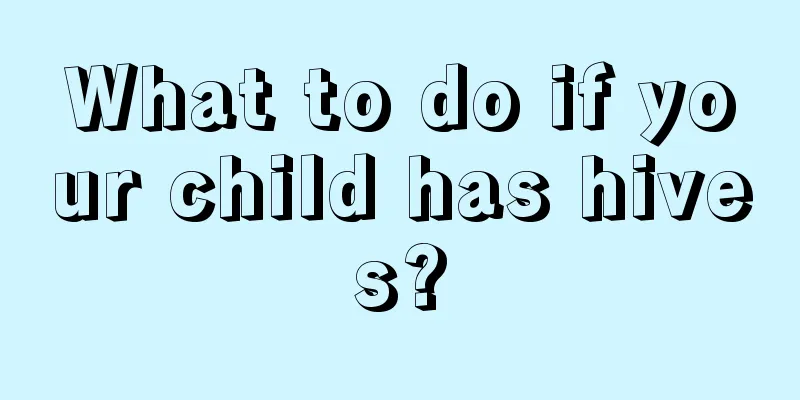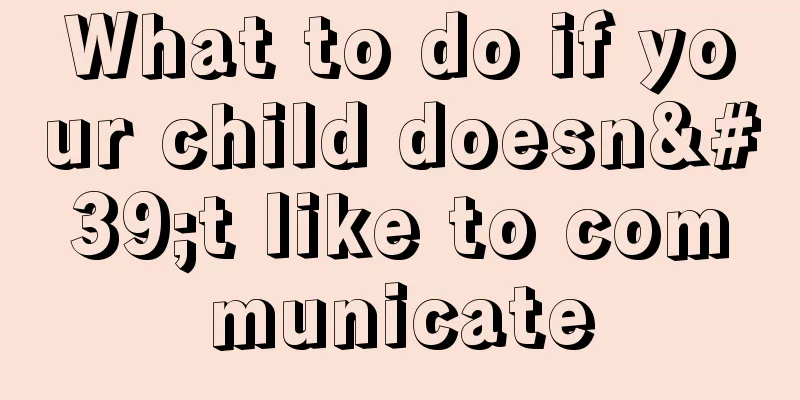What to do if your child has hives?

|
Urticaria patients are of all ages, from infants a few months old to the elderly in their seventies and eighties, and they may all suffer from this skin disease. This disease is also one of the frequently occurring and common diseases in children. Some children get sick after being bitten by insects, some get sick due to being allergic to breast milk, and some get sick due to bacterial infection due to poor resistance. So, how should we care for children with urticaria? 1. Urticaria in children Urticaria is not only a common disease in adults, but also a common disease in children, and the age of onset can range from newborn babies to children in their teens. 2. Causes 1. Children aged 2-7 lack self-control ability. When they go outdoors, in the wild, in the bushes, or under street lights in the evening, they are often easily bitten by insects or come into contact with pollen, dust, mites, and the fur of pets such as cats and dogs. 2. The most common suspected cause is food, such as infants are mainly fed with breast milk, milk and dairy products. 3. The next cause is drugs, with vaccines being the most common. 4. Infection: Children in childhood and early childhood have low resistance and are prone to various infections. Therefore, diseases such as purulent tonsillitis, pharyngitis, enteritis, upper respiratory tract infection, etc. can become the triggering factors of urticaria all year round. Symptoms 1. Sudden itching of the skin. The irregular wheals are bright red or pale or surrounded by a red halo and usually disappear within 24 hours without leaving scales or pigmentation. 2. Papular urticaria or erythema multiforme was ruled out. A few cases may be accompanied by abdominal pain, diarrhea, or respiratory system manifestations such as bronchial asthma and laryngeal edema. 3. Routine blood examination showed increased eosinophilia and positive skin scratches. The course of the disease may be chronic with recurrent attacks. 4. Nursing measures 1. Pay attention to weather changes and keep warm to avoid cold urticaria; children with urticaria should wear loose and breathable clothing to avoid irritation to the affected area; pay attention to hygiene, and it is important to prevent mites at home. 2. Children with measles should be isolated at home unless there are any complications. The isolation period is 5 days, and if there are complications, it needs to be extended to 10 days. Since the measles virus quickly loses its pathogenicity once it leaves the human body, the purpose of air disinfection can be achieved as long as windows are opened frequently for ventilation in the room. 3. Rest in bed until the rash subsides and symptoms disappear. In order to allow sick children to rest well, a good rest environment should be created for them. The room should be quiet, the air should be fresh and moist, and windows should be opened frequently for ventilation, but drafts should be avoided and cold wind should not be allowed to blow directly on the sick child. Strong light should be avoided to irritate the sick child's eyes. Curtains should be drawn on the windows and light bulbs should be covered with lampshades. 4. Eat light and easily digestible liquid or semi-liquid food. Drinking more water or hot soup will not only help to excrete toxins from the body and reduce fever, but also promote blood circulation and make the rash easier to break out. When the rash subsides and the recovery period begins, add nutritious food in time. |
<<: How to reduce swelling and stasis after a child falls
>>: What causes baby sweating?
Recommend
What to do if children have ingrown eyelashes
Inverted eyelashes are a relatively common phenom...
What is the cause of the three-year-old's headache?
If children have frequent headaches during their ...
What to do if a child has a viral cold and fever
Viral colds are a very common disease for babies ...
Reasons for yellow urine in six-month-old babies
Many parents are particularly worried when their ...
Why do children often have nosebleeds?
As we all know, nosebleeds occur at all ages and ...
What's wrong with a three-month-old baby who frequently retches?
The baby's health is very prone to problems b...
Can children use enema?
Suppository is a very common laxative, mainly sui...
Scarlet fever diet, don't eat these foods
Scarlet fever is highly contagious. Clinically, t...
How much sleep does a 17 month old baby need?
Sleep is very important for babies, because babie...
Red pimples on baby's face and hands
Babies' constitutions are naturally weaker th...
Can the baby be vaccinated if he has diarrhea?
Friends who are parents all know that if the baby...
Why does a 6-year-old boy urinate frequently?
Symptoms of frequent urination and urgency are mo...
How to prevent children’s bleeding teeth?
Children nowadays are particularly prone to eatin...
What to do if your child has blindness
Due to lack of attention to eye hygiene, often ru...
What are the causes of herpetic pharyngitis in children?
With the rapid development of society, various ac...









